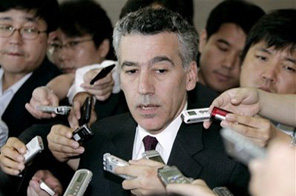NKorea invites Obama's top envoys
SEOUL: North Korea has invited top envoys of President Barack Obama to visit the communist nation in what would be the first nuclear negotiations between the two countries under his presidency, a news report said Tuesday.
North Korea recently invited Stephen Bosworth, special envoy to North Korea, and chief nuclear negotiator Sung Kim to Pyongyang, and the U.S. government is strongly considering sending them to the North next month, Seoul's JoongAng Ilbo daily reported.
There was not immediate response to the report from U.S. officials. Calls by The Associated Press to the U.S. Embassy in Seoul went unanswered.
The JoongAng report, citing an unidentified high-level diplomatic source in Washington, said the U.S. diplomats might be able to meet with North Korean leader Kim Jong Il during the visit, considering Pyongyang's recent conciliatory attitude.
Yonhap news agency also reported that the North has invited the two officials and that the U.S. is reviewing the offer.
Such a trip would mark the first nuclear negotiations between the U.S. and North Korea under the Obama administration.
Pyongyang has long sought direction negotiations with Washington about its nuclear program and other issues, hoping to boost its international profile. The U.S. has said it is willing to talk bilaterally to Pyongyang, but only within the framework of six-party talks involving the two Koreas, the U.S., China, Russia and Japan.
Over the past year, North Korea had been stoking tensions with nuclear and missile tests while boycotting international nuclear talks. But in recent weeks, the North has become markedly more conciliatory toward the U.S. and South Korea.
The North freed two American journalists following a trip to Pyongyang by former President Bill Clinton earlier this month. It has also released a South Korean worker it held for more than four months, agreed to lift restrictions on border crossings with the South, and pledged to resume suspended joint inter-Korean projects and reunions of families separated during the Korean War over five decades ago.
On Tuesday, Pyongyang accepted a South Korean offer to hold Red Cross talks from Wednesday to Friday to organize a new round of reunions of separated families, Seoul's Unification Ministry spokesman Chun Hae-sung said. The North also restored a direct telephone line via the border village of Panmunjom, he said.
Separately, South Korea planned to attempt again to shoot its first space rocket later Tuesday after last week's bid aborted due to a technical glitch. North Korea has warned it would be "watching closely" for the international response to Seoul's launch.
The rival Koreas are eager to develop space programs, and had aimed to send satellites into space this year. In April, the North launched a three-stage rocket it claimed sent a communications satellite into orbit; some experts doubt the mission succeeded.
Washington, Tokyo and others called that launch a disguised test of long-range missile technology. The U.N. Security Council condemned the launch, saying it was a violation of resolutions banning North Korea from ballistic missile-related activity.
Despite the series of recent overtures from Pyongyang, Seoul and Washington have remained firm that they need to see North Korea taking concrete steps on ending its nuclear programs before they consider softening their stance on a nation known for backtracking on agreements.
"We are sticking to our existing position that we will continue faithfully carrying out U.N. resolutions while urging North Korea to return to six-party talks" on its nuclear programs, Seoul's Foreign Ministry spokesman Moon Tae-young said regarding talks over the weekend between Bosworth and South Korean officials.
Washington has been keeping up pressure on Pyongyang to dismantle its nuclear programs, sending a senior official to Asia to seek support for stringent implementation of the U.N. sanctions meant to punish the North for its May 25 nuclear test.
North Korea has long balanced stoking tensions with conciliatory overtures to extract concessions and head off sanctions.
After a long impasse in the nuclear standoff, Pyongyang carried out its first-ever nuclear test in 2006. The bold move resulted in a U.N. sanctions resolution, but the North got away unscathed by agreeing to return to the negotiating table.
Subsequent talks made some progress, but stalled again later and led to Pyongyang's second nuclear test in May. South Korea and the U.S. have repeatedly said they don't want to repeat this pattern.






